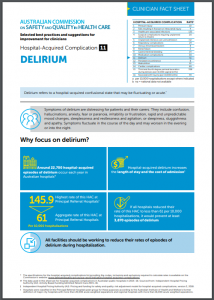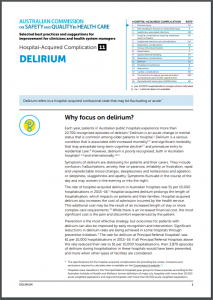A hospital-acquired complication (HAC) refers to a complication for which clinical risk mitigation strategies may reduce (but not necessarily eliminate) the risk of that complication occurring. HACs extend the length of hospitalisation, which impacts on patients and their families.
A national list of 16 high-priority HACs was developed through a comprehensive process that included reviews of the literature, clinical engagement and testing of the concept with public and private hospitals.
The Commission has developed a range of resources to support adoption of the HACs list, improve patient safety and healthcare quality. These resources were developed to support services to put in place strategies that reduce the occurrence of HACs, and support the best outcomes for patients.
Information regarding all of the HACs and supporting resources, their development, why they are important, and how monitoring and responding to HACs can help provide the best care for patients is available on the Commission’s website.
Each year, patients in Australian public hospitals experience more than 22,700 recognised episodes of delirium. Delirium is an acute change in mental status that is common among older patients in hospital. 
The rate of hospital-acquired delirium in Australian hospitals was 51 per 10,000 hospitalisations in 2015–16. Hospital-acquired delirium prolongs the length of hospitalisation and the cost of admission incurred by the health service. The additional cost may be the result of an increased length of stay or more complex care requirements. While there is an increased financial cost, the most significant cost is the pain and discomfort experienced by the patient.
Prevention is the most effective strategy, but outcomes for patients with delirium can also be improved by early recognition and intervention. Significant reductions in delirium rates are being achieved in some hospitals through preventive initiatives.
For further information about delirium as a HAC, the following resources are available: